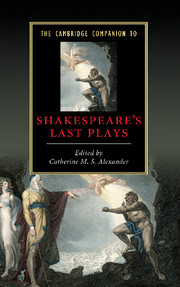Book contents
- Frontmatter
- Introduction
- 1 What is a ‘late play’?
- 2 Blackfriars, music and masque: theatrical contexts of the last plays
- 3 The literary and dramatic contexts of the last plays
- 4 Politics, religion, geography and travel: historical contexts of the last plays
- 5 ‘You speak a language that I understand not’: listening to the last plays
- 6 The Winter’s Tale: shifts in staging and status
- 7 Cymbeline: the afterlife
- 8 Literary invocations of The Tempest
- 9 Pericles: the afterlife
- 10 The Two Noble Kinsmen and King Henry VIII: the last last plays
- Further reading: Clare Smout
- Index
10 - The Two Noble Kinsmen and King Henry VIII: the last last plays
Published online by Cambridge University Press: 28 May 2010
- Frontmatter
- Introduction
- 1 What is a ‘late play’?
- 2 Blackfriars, music and masque: theatrical contexts of the last plays
- 3 The literary and dramatic contexts of the last plays
- 4 Politics, religion, geography and travel: historical contexts of the last plays
- 5 ‘You speak a language that I understand not’: listening to the last plays
- 6 The Winter’s Tale: shifts in staging and status
- 7 Cymbeline: the afterlife
- 8 Literary invocations of The Tempest
- 9 Pericles: the afterlife
- 10 The Two Noble Kinsmen and King Henry VIII: the last last plays
- Further reading: Clare Smout
- Index
Summary
It is frequently assumed that The Tempest is Shakespeare's last play: there is something satisfyingly coherent to the notion of the bard, meditating on age and imminent retirement, using Prospero as a projection to bid farewell to 'the cloud-capped towers, the gorgeous palaces, the solemn temples, the great globe itself' (The Tempest, 4.1.152-3) and riding off to Stratford and the shadows, only to drink himself to death, merrily, with Ben Jonson not many years later. This fairy-tale fantasy of the conclusion of Shakespeare's artistic career is found in many writings about the 'late' or 'last' plays, and is interwined with the assumption that Shakespeare, at the end of his career and in his full powers, did not bother to collaborate with lesser writers. Unfortunately, neither of these constructions is true. Following The Tempest Shakespeare, who had occasionally worked with collaborators previously, most recently with George Wilkins on Pericles, apparently turned to a rising star of the Jacobean theatre, John Fletcher - although, as we shall see, Fletcher may have turned to him. The collaboration resulted in three plays: Cardenio, now lost; King Henry VIII, or All is True; and The Two Noble Kinsmen, written under varying circumstances and perhaps emerging from different methods of joint writing. Then, it seems, there was nothing more from Shakespeare's pen.
- Type
- Chapter
- Information
- The Cambridge Companion to Shakespeare's Last Plays , pp. 185 - 202Publisher: Cambridge University PressPrint publication year: 2009



